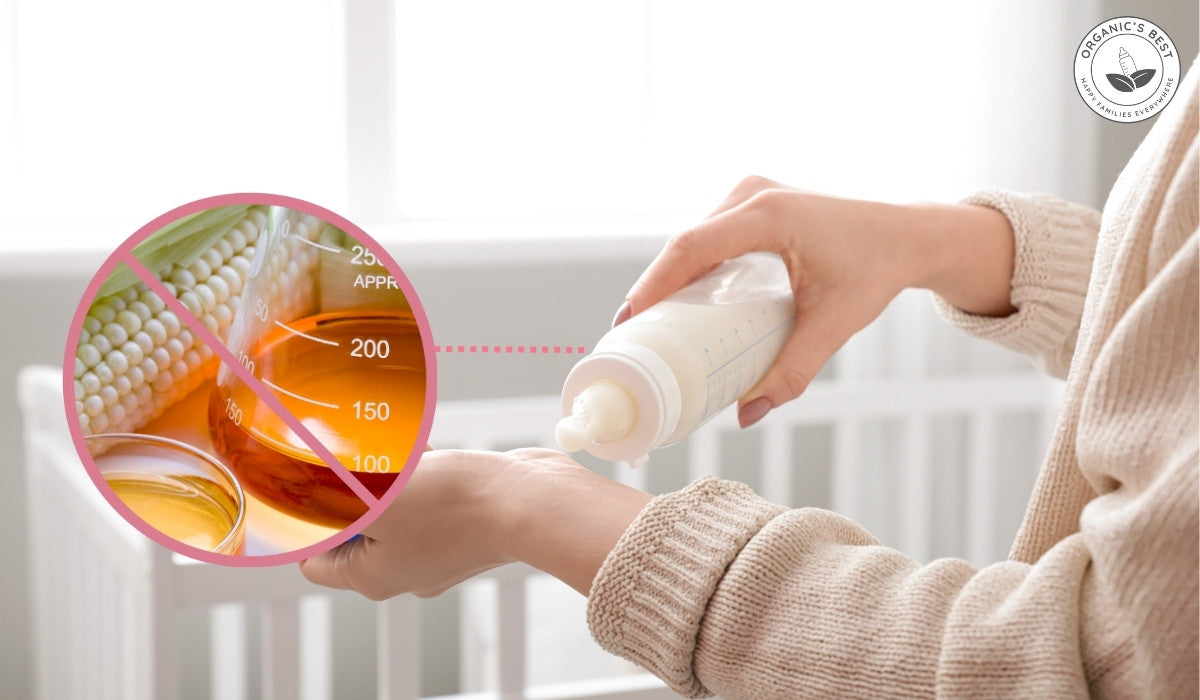Click to Get 2 FREE Boxes/Cans
Click to Get 2 FREE Boxes/Cans
Only New Customers! Click HERE to Get 2 Extra Boxes/Cans for Free With Your First Order.
Only New Customers! Click HERE to Get 2 Extra Boxes/Cans for Free With Your First Order.
BABY FORMULA
Offering new parents top-quality European infant formula from renowned brands like HiPP, Holle, Kendamil, and more. If you’re uncertain about which product to choose, our Formula Finder can help you make the best decision for your baby.
Baby Food
Offering new parents a premium selection of European baby foods, including jars, pouches, cereals, and snacks from esteemed brands like HiPP and Holle.
Best Infant Formula Without Corn Syrup
by Agustina Fernandez February 07, 2024 11 min read

Lactose is the primary carbohydrate in the milk of all land mammals. That’s right, from human milk to cow's milk and even buffalo milk, lactose is the sugar responsible for providing babies with the energy they need.
So, if lactose is so important, why is choosing lactose-free formula all the rage these days despite a growing body of research suggesting that certain common substitutes for lactose, like corn syrup, may have health consequences for your child?
Here, we dive into what corn syrup is and why it’s controversial. Plus, we'll walk you through our top 3 favourite lactose-based organic baby formula without corn syrup or added sugar! You will learn why we, and many others, love European formula as an alternative to conventional baby formula made with corn syrup solids.
Table of contents
Corn Syrup in Formula: A Quick Overview
To begin, let's discuss what corn syrup is, why it's included in infant formulas, and whether or not this sugar is safe for your baby.
What is Corn Syrup?

Corn syrup is 100% glucose (sugar) derived from hydrolyzed corn starch. There are two types of corn syrup products: regular and high-fructose corn syrup. High-fructose corn syrup is more highly processed, with some of the glucose altered to fructose, producing a much sweeter product widely used in the food industry as a cheaper alternative to more natural sugars.
Why is Corn Syrup in Baby Formula?
With specialized formulas on the rise, formula companies have taken to using corn syrup as a carbohydrate replacement, and to mask the bitter taste that some special formulas have.
The growing popularity of special lactose-free and lactose-reduced infant formula can be partially explained by parents’ misguided belief that their baby's trouble digesting a formula is caused by lactose. In reality, there are so many reasons why babies may have trouble with digestion, and lactose intolerance is an infrequent culprit.
Is Corn Syrup Safe for Babies?
Dietary guidelines recommend zero added sugars in the first two years of life, as evidence suggests that early exposure to sugars in baby food plays a role in shaping an infant’s taste preferences and increases the risk of childhood obesity.
One study found a link between an increase in certain gut bacteria and a high risk of obesity in infants fed formula with added sugars compared to breastfed babies. This indicates that infants who consume formula with corn syrup may have an altered gut microbiome.
Consuming added sugars has been shown to increase fussiness and other food-related behavioural problems in infants, which has been linked to the development of a poor-quality diet.
Of particular concern is the high glycemic index of formulas made with added sugars versus traditional lactose-based formulas. Consuming foods with a high glycemic index spikes blood sugar and insulin levels, which increases the risk of diabetes and other chronic conditions like heart disease and certain cancers.
If hearing all that has got you thinking twice about this common baby formula ingredient, then keep reading for the best formulas from Europe with no pesky corn syrup!
Ranking The Best Formula Without Corn Syrup
We're here to help you on your formula-finding journey! To do so, we have spent hours researching formulas, scrutinizing scientific studies, and analyzing ingredient lists so that we can give trustworthy and reliable recommendations based on the latest scientific findings in infant nutrition. We encourage you to check out our "How We Review Page" for more info on our standards for rating each product.

To make our ranking system as comprehensive as possible, we have evaluated each baby formula based on five key criteria: European organic certification, non-GMO ingredients, lactose or milk as the primary ingredient, no added sugars or artificial sweeteners, and the inclusion of ARA & DHA.
We've also awarded bonus points for the inclusion of probiotics and prebiotics and the absence of maltodextrin, starch, and palm oil. Each performance category is assigned 1 point for a maximum of 10 points in total.

#1 HiPP Dutch - Best Cow’s Milk Formula without Corn Syrup
HiPP Dutch infant formula is made in Germany with an impressive blend of organic ingredients. It has a base of lactose as the primary carbohydrate source, making it extra gentle for sensitive stomachs and more similar to breast milk. Plus, its unique formulation is designed to help support easier digestion.
Pros ✔️
-
All stages are free from starch and maltodextrin
-
EU certified organic
-
Enriched with probiotics originally sourced from breast milk
Cons ❌
-
Contains sustainably sourced palm oil
-
Contains fish oil (As a source of DHA)
Leading Qualities of HiPP Dutch
Starting strong, we were pleased to see that this infant formula is certified EU organic, which aligns perfectly with our desire to showcase formulas that meet the most stringent safety and quality standards.
Speaking of quality standards, in accordance with EU organic regulations, HiPP Dutch is also made without any genetically modified organisms (GMOs). The long-term effects of GMO consumption are still being studied, but what we do know is that there are concerns surrounding allergenicity, toxicity, nutritional changes and antibiotic resistance.
We were happy to find that lactose, the natural carbohydrate in milk, is the star of HiPP Dutch, alongside organic whey. This lactose-based formula is gentle on tiny tummies and compositionally similar to breast milk.
To keep this formula gentle and close to nature, HiPP has omitted all added sugars or artificial sweeteners such as corn syrup solids. What they do include is a nutritionally dense assortment of vitamins and minerals geared specifically toward infants.
In particular, HiPP Dutch infant formula contains Metafolin® instead of folic acid, which is more easily absorbed by babies and is similar to the folate source found in breast milk.
We're also impressed by the inclusion of ARA and DHA in an optimal 1 to 1 ratio, as our review of infant nutrition literature demonstrates this is the most effective balance of these fatty acids for health and development.
Bonus Points Awarded to HiPP Dutch ☆
We've noted that HiPP Dutch uniquely contains natural probiotic lactic acid cultures originally extracted from real human milk, which supports digestive and immune health.
On top of this, prebiotics are included to create a balanced gut microbiome and keep constipation, bloating, and gas at bay. Notably, research shows that the "addition of prebiotics in infant formula alters the gastrointestinal (GI) microbiota resembling that of breastfed infants.".
We have removed a point from HiPP Dutch for the use of palm oil, which is an ingredient that has some controversy tied to it. That being said, HiPP takes a conscious approach to the sourcing of their palm oil and utilizes it to attain a fatty acid spectrum closer to that of human milk.
All in all, this formula scores an impressive 9/10, making it an excellent choice for those who are on the lookout for a lactose-based formula that is free from corn syrup and other carbohydrates that receive mixed reviews, like corn starch or maltodextrin.
What Parents Say 💬
|
#2 HiPP HA - Best Hypoallergenic Formula without Corn Syrup
HiPP HA is meticulously crafted to promote immune balance and safeguard infants with a predisposition to allergies. Its formulation features easily digestible hydrolyzed whey protein, as well as prebiotics and probiotics. These components work in tandem to fortify your baby's intestinal barrier, guarding against undesired allergic responses.
Please consult your pediatrician to see if this formula is a good match for your baby, as HiPP HA may not be suitable for little ones with CMPA.
Pros ✔️
-
Enriched with probiotics originally sourced from breast milk
-
All stages are free from starch and maltodextrin
-
Offered in ready-to-feed bottles
Cons ❌
-
Contains sustainably sourced palm oil
-
Not certified organic
Leading Qualities of HiPP HA
A key feature of HiPP HA is the inclusion of extensively hydrolyzed proteins. These broken-down proteins help reduce allergenicity for babies who can't have regular formulas with intact cow's milk. Despite not bearing the EU organic label due to the inclusion of hydrolyzed milk proteins, HiPP HA is proudly free from GMOs!
We're happy to see this because studies from The World Health Organization’s International Agency on Research for Cancer have determined "that glyphosate, a herbicide widely used in producing GMO food crops, is a probable human carcinogen".
These findings explain why some families wish to minimize their exposure to GMOs. However, it comes down to personal preference, as further research is needed to fully understand how GMOs affect human health.
Moreover, in alignment with our search for the best baby formulas without corn syrup, HiPP HA boasts an impressive nutritional profile that excludes added sugars and artificial sweeteners like corn syrup solids.
We awarded HiPP HA with another point for containing fatty acids ARA and DHA, which are included in an optimally balanced ratio to support eye and brain development.
Bonus Points Awarded to HiPP HA ☆
Probiotics are friendly microorganisms that, when introduced to an infant's gastrointestinal tract, offer immune and digestive health benefits. HiPP HA uniquely contains a proven combination of probiotics originally extracted from real breast milk and prebiotics to help fortify your baby's intestinal wall and protect against allergens and unwanted bacteria.
We've awarded HiPP HA two bonus points for excluding both starch and corn maltodextrin. These ingredients are sometimes used in lieu of lactose or corn syrup solids, and while they are safe, they can be more difficult to digest and, therefore, wouldn't be particularly useful in this gentle formulation.
Lastly, we have withheld a point for the inclusion of palm oil because some parents aren't particularly fond of this ingredient. Despite this, HiPP includes palm oil with the intention of replicating the fatty acid spectrum of breast milk. HiPP reports that the use of this ingredient offers numerous benefits, such as regulating bowel movements.
Despite not being organic and including palm oil, HiPP HA scores a grand 8/10, which sets it just slightly below HiPP Dutch. This runner-up is a great corn syrup-free option for little ones who require a special diet.
What Parents Say 💬''I switched my 10 month old baby who has CMPA from one of the American amino acid-based milk formulas to organic HIPP HA Hypoallergenic follow on infant formula last month. In comparison to the previous milk he was on, he really has taken on to this milk and is doing well. I no longer have to add sweetener to the milk for him to take [it]. This has been a life saver. I wish I had discovered it earlier.'' |
#3 Holle Goat Dutch - Best Baby Formula without Corn Syrup and Palm oil
Holle goat milk formula is a mild formula suitable for babies with feeding sensitivities to cow’s milk. This clean and gentle goat’s milk formula is specifically developed for the Dutch market but is loved by babies around the world!
It is a reliable alternative formula for little ones with digestive sensitivities, excluding more severe conditions like a cow's milk protein allergy or lactose intolerance.
Pros ✔️
-
Easier to digest A2 milk protein
-
EU Organic and Demeter-certified
-
No gluten, soy, palm oil, or fish oil
Cons ❌
-
No prebiotics or probiotics
-
Stage 2 and Stage 3 contain starch and maltodextrin
Leading Qualities of Holle Goat
To begin our evaluation, we were impressed to see that this baby formula is backed by the Demeter certification, which carries the highest organic standards in Europe. This means that Holle Goat is also free from GMOs.
Something that we noticed about this formula from the get-go was its strong nutritional base of organic whole goat’s milk, which studies show is often more tolerated by babies with digestive sensitivities. This is because the proteins found in goat milk based formula tend to form milk clumps in the stomach that are smaller, softer, and looser than those formed by cow's milk.
In accordance with organic principles, Holle Goat Dutch is also free from added sugar and artificial sweeteners like corn syrup solids. Although you will find essential fatty acids (DHA and ALA).
Bonus Points Awarded to Holle Goat ☆
To keep the ingredient list as short as possible, Holle avoids adding prebiotics and probiotics. While this makes it a great choice for parents looking for a simple ingredients list, we have removed two points in these categories.
We did, however, award points for the exclusion of both starch and maltodextrin in Stage 1. Although, you will find these complimentary carbs in Stages 2 and 3. These ingredients are added in the later stages to create a smooth, creamy texture that can help keep your baby feeling full for longer.
Compared to the other formulas mentioned above, Holle Goat is the only formula that is free from palm oil, so that is something to consider if you aim to avoid this ingredient for ecological or health reasons.
This formula scores a whopping 8/10. While it lost points for excluding prebiotics and probiotics, this formula is still an excellent choice if you're in the market for an alternative to cow's milk infant formulas.
What Parents Say 💬
|
Is Lactose The Best Carbohydrate in Baby Formula?
Lactose is the most abundant carbohydrate in mammalian milk, including human milk. It is revered by experts as the gold standard of carbohydrates for infants. Lactose in breast milk provides almost half of the total energy required by infants in their first year of life! In Europe, regulations require that the carbohydrate content of formulas must be comprised of at least 30% lactose.
Other Alternatives to Corn Syrup Solids in Formula
In addition to lactose and corn syrup solids, these are some other carbohydrates you'll see used in infant formulas.

Maltodextrin
Maltodextrin is widely used in European formulas, particularly in dairy-free and partially hydrolyzed formulas. It is sourced from rice, potato, wheat, or corn starch. It shares similarities to corn syrup solids but has a reduced sugar content.
Starch
Starch is a complex carbohydrate typically extracted from corn or rice. Starch is used to thicken baby formula, and since it takes longer to digest, it keeps babies feeling fuller between feedings.
Sucrose & Maltose
Commonly known as cane sugar or table sugar, these are made of two sugar molecules linked together called disaccharides.
Conclusion on Baby Formula Without Corn Syrup
Infant nutrition is complex, but knowing what ingredients to look for can make a huge difference in setting your baby up for nutritional success as they continue to grow and develop. So, now that you know why avoiding corn syrup in baby formula may help reduce long-term health issues posed by added sugar in your baby's diet, it's time to choose a formula that aligns with your goals.
If you're in the market for a formula that is free from corn syrup, then HiPP Dutch may be what you are looking for. That being said, you can be confident in choosing any of our organic European formulas that are free of corn syrup and made with high-quality ingredients.
Scientific References
- Abrams, S. A., Albin, J., Landrigan, P. J., Corkins, M. R., Blanco, C. L., Fuchs, G. J., Godoy, P., Hannon, T. S., Lindsey, C. W., Rome, E. S., Bremer, A. A., Lots, A., Perrine, C., Sant’Anna, A., Funanich, C., Burrowes, D. L., Bole, A., Balk, S. J., Byron, L. G., . . . Spire, P. (2023). Use of genetically modified organism (GMO)-Containing food products in children. Pediatrics, 153(1).
- Anderson, C., Whaley, S. E., & Goran, M. I. (2022). Lactose-reduced infant formula with corn syrup solids and obesity risk among participants in the Special Supplemental Nutrition Program for Women, Infants, and Children (WIC). The American Journal of Clinical Nutrition, 116(4), 1002–1009.
- Bawa, A. S., & Anilakumar, K. (2012a). Genetically modified foods: safety, risks and public concerns—a review. Journal of Food Science and Technology, 50(6), 1035–1046.
- Jones, R. B., Berger, P. K., Plows, J. F., Alderete, T. L., Millstein, J., Fogel, J. L., Iablokov, S. N., Rodionov, D. A., Osterman, A. L., Bode, L., & Goran, M. I. (2020). Lactose-reduced infant formula with added corn syrup solids is associated with a distinct gut microbiota in Hispanic infants. Gut Microbes, 12(1), 1813534.
- Myers, J. P., Antoniou, M., Blumberg, B., Carroll, L., Colborn, T., Everett, L. G., Hansén, M., Landrigan, P. J., Lanphear, B. P., Mesnage, R., Vandenberg, L. N., Saal, F. S. V., Welshons, W. V., & Benbrook, C. (2016). Concerns over use of glyphosate-based herbicides and risks associated with exposures: a consensus statement. Environmental Health, 15(1).
- Salem, N., & Van Dael, P. (2020). Arachidonic acid in human milk. Nutrients, 12(3), 626.
- Sherman, A. L., Anderson, J., Rudolph, C. D., & Walker, L. S. (2015). Lactose-Free milk or Soy-Based formulas do not improve caregivers’ distress or perceptions of difficult infant behavior. Journal of Pediatric Gastroenterology and Nutrition, 61(1), 119–124.
|
Disclaimer: Please be aware that this information is based on general trends in babies, and it is not medical advice. Your doctor should be your first source of information and advice when considering any changes to your child’s formula and when choosing your child’s formula. Always consult your pediatrician before making any decisions about your child’s diet or if you notice any changes in your child. Breastfeeding is the best nutrition for your baby because breast milk provides your child with all the essential nutrients they need for growth and development. Please consult your pediatrician if your child requires supplemental feeding. |
Agustina Fernandez
Dr. Agustina Fernandez earned her medical degree from the prestigious Universidad Nacional de Córdoba, Argentina. With a deep-rooted passion for pediatrics, Dr. Fernandez is currently on the path to specializing in children's healthcare. Recently, she has delved into the vital field of infant nutrition. Her research interests include breastfeeding, infant formula, and baby food in little ones’ formative years. Dr. Fernandez's commitment to this area of study underscores her dedication to ensuring the health and well-being of children from their earliest days.
Leave a comment
Comments will be approved before showing up.
Also in Organic Infant Nutrition and Health Blog

10 Winter Activities for Kids and Toddlers
by Agustina Fernandez January 06, 2026 8 min read
Read More
How to Choose The Best Infant Formula: A Guide to EU Organic Formulas
by Agustina Fernandez January 05, 2026 14 min read
Read More
Best Formula for Breastfed Babies 2026 Guide
by Agustina Fernandez January 05, 2026 15 min read
Read More
Reviewed by Dr. Po-Chang Hsu, MD, MS
-

Dr. Po-Chang Hsu: Medical Reviewer of Organic's Best Blog
Dr. Hsu received his medical degree from Tufts University in Boston, Massachusetts, and holds a Master’s of Science degree from both Harvard University and Tufts University.



